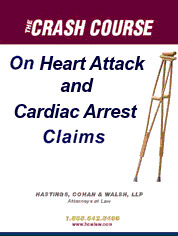AED Negligence Claims
Following are answers to common questions about heart attacks and AEDs.
What public locations must have automated external defibrillators?
It depends on the state in question. Some of the types of public places that may be required to keep AEDs on site include airplanes and airports, cruise ships, golf courses, sporting arenas and concert venues, pools, nursing homes, restaurants, theme parks, health clubs, and dental offices. Contact negligence claims attorney Richard Hastings so he can attempt to find you one of the best lawyers in your area to provide you with specific information about your AED state laws.
How can an AED save lives?
Automated external defibrillators are devices that deliver an electric pulse straight to the heart during heart attack or cardiac arrest, effectively “shocking” the heart back into its normal rhythm. Small electrodes are applied to the chest, allowing the computer module to evaluate the dysfunction of the heart. Today’s AEDs are able to “read” the victim’s abnormal or stopped heartbeat and automatically choose the appropriate amount of electric current to apply. Most models of AEDs are capable of guiding the user with clear visual or audible instructions.
Who can administer AED treatment?
AEDs were designed so that non-medical personnel can respond to the emergency situation of cardiac arrest. Trained personnel who are certified on AED use should be the first choice for delivering AED treatment. In the absence of certified personnel, anyone on site may attempt to administer AED treatment. Public venues that are required by law to keep AEDs in good working order are required to ensure their staff is well trained for this emergency response. These public forums must also see to it that staff members who are certified in AED application are available at all times.
What kinds of scenarios might be considered AED negligence?
Not having an AED on site that is required to have one usually creates a clear AED negligence claim. Businesses may also be held legally responsible for heart attack injuries if staff members were untrained in the use of AED, the AED was not maintained or faulty, or the staff members did not respond quickly enough to prevent severe or fatal harm.
What is the first step if AED negligence is suspected?
Your loved one suffered a serious or fatal heart attack and your family knows that something more could have been done. For answers to your questions about AED laws and your right to sue, contact negligence claims attorney Richard Hastings so he can help you find one of the best lawyers in your area to share their heart attack litigation experience with you.
Q: IF I RETAIN AN ATTORNEY HOW MUCH WILL IT COST?
A: Most accident/injury cases are taken on a “contingency” basis. That means that the attorney charges no fee unless and until you receive money from a settlement or court award. This amount may vary from state to state. In most instances, the attorney will advance the costs and will collect them from the settlement or award.
Q: WHO WILL PAY MY EXPENSES?
A: In most cases, the law firm or attorneys will advance all costs and expenses of the case as they are incurred. Once the case is concluded, they would be reimbursed for their costs and expenses out of the recovery. In some states, even if there is no recovery, the client is still responsible for the costs and expenses of the case even though the client owes no legal fees. In other states, if there is no recovery, the client will owe nothing for the cost and expenses, which will be absorbed by the law firm or attorney.
Q: WHAT IS A LAWYER REFERRAL SERVICE SUCH AS HEARTATTACKATTORNEY.US ?
A: A lawyer referral service refers potential clients to attorneys who may be interested in taking their case.
Q: HOW CAN HEARTATTACKATTORNEY.US HELP ME?
A: HEARTATTACKATTORNEY.US will have your case reviewed by an attorney consultant . If appropriate, HEARTATTACKATTORNEY.US will refer you to one of the best law firms in your state for your particular type of case.
Q: HOW DOES HEARTATTACKATTORNEY.US WORK?
A: When you contact HEARTATTACKATTORNEY.US you will provide us with information about your potential claim. HEARTATTACKATTORNEY.US will obtain all of the needed information from you and then, if appropriate, refer you to one of the best law firms in your state.
Q. HOW MUCH WILL I HAVE TO PAY FOR THIS SERVICE?
A: The service provided by HEARTATTACKATTORNEY.US is free. As is the case will all contingency fee cases, the client pays the law firm that handles his/her case only if there is a recovery. If there is no recovery, there is no fee. In some states, even if there is no recovery, the client is still responsible for the costs and expenses of the case even though the client owes no legal fees. In other states, if there is no recovery, the client will owe nothing for the costs and expenses, which will be absorbed by the law firm or attorney.
At the successful conclusion of a case, HEARTATTACKATTORNEY.US is paid a referral fee, by the referred law firm, which in no way increases the cost that the client pays to the law firm that represented him/her.
